Bioethical Principles (Case Study)
VerifiedAdded on 2023/01/04
|8
|2522
|26
AI Summary
This article explores the application of bioethical principles in a case study involving a diabetic patient with drinking and sexual habits. It discusses the principles of autonomy, beneficence, nonmaleficence, and justice in healthcare.
Contribute Materials
Your contribution can guide someone’s learning journey. Share your
documents today.
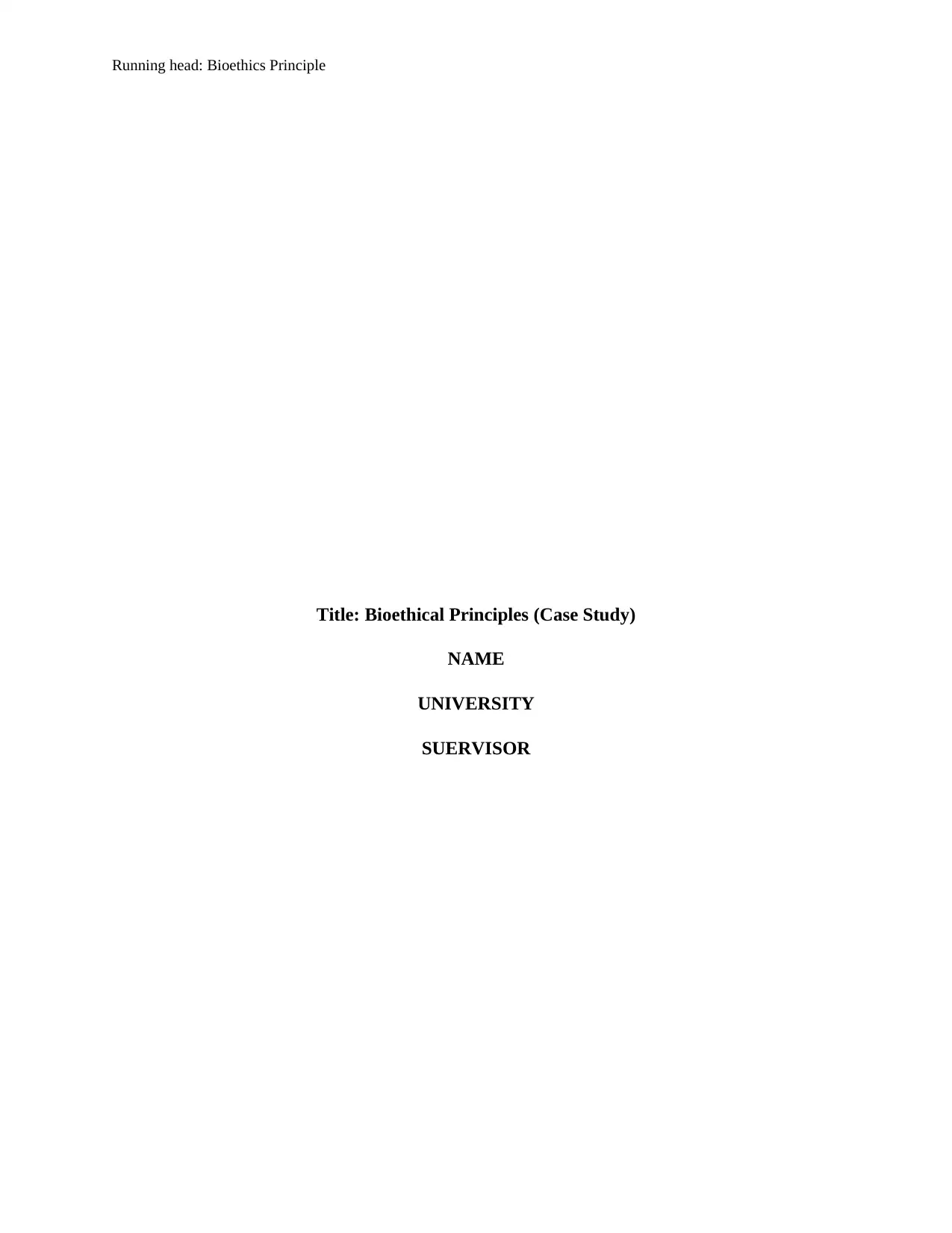
Running head: Bioethics Principle
Title: Bioethical Principles (Case Study)
NAME
UNIVERSITY
SUERVISOR
Title: Bioethical Principles (Case Study)
NAME
UNIVERSITY
SUERVISOR
Secure Best Marks with AI Grader
Need help grading? Try our AI Grader for instant feedback on your assignments.
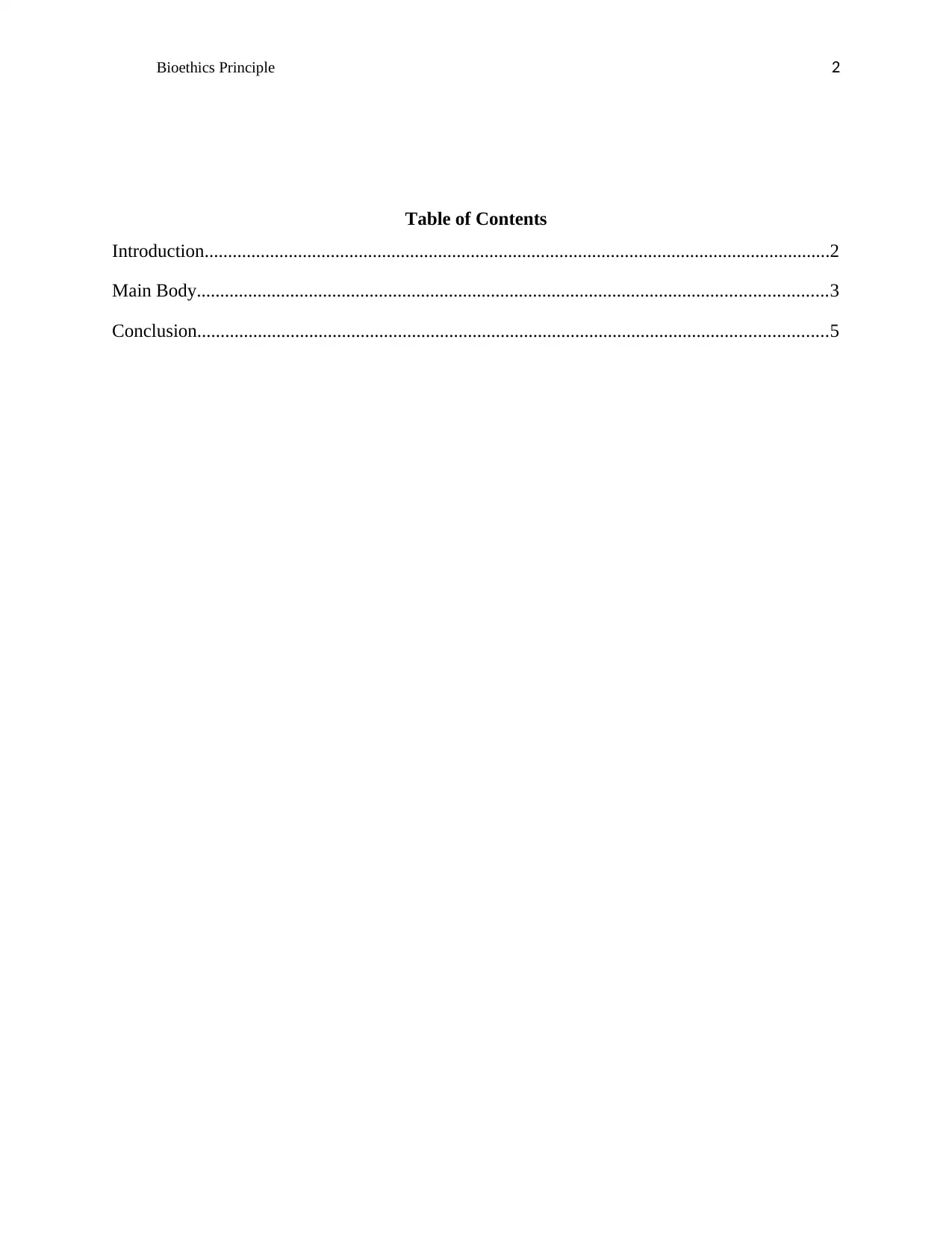
Bioethics Principle 2
Table of Contents
Introduction......................................................................................................................................2
Main Body.......................................................................................................................................3
Conclusion.......................................................................................................................................5
Table of Contents
Introduction......................................................................................................................................2
Main Body.......................................................................................................................................3
Conclusion.......................................................................................................................................5
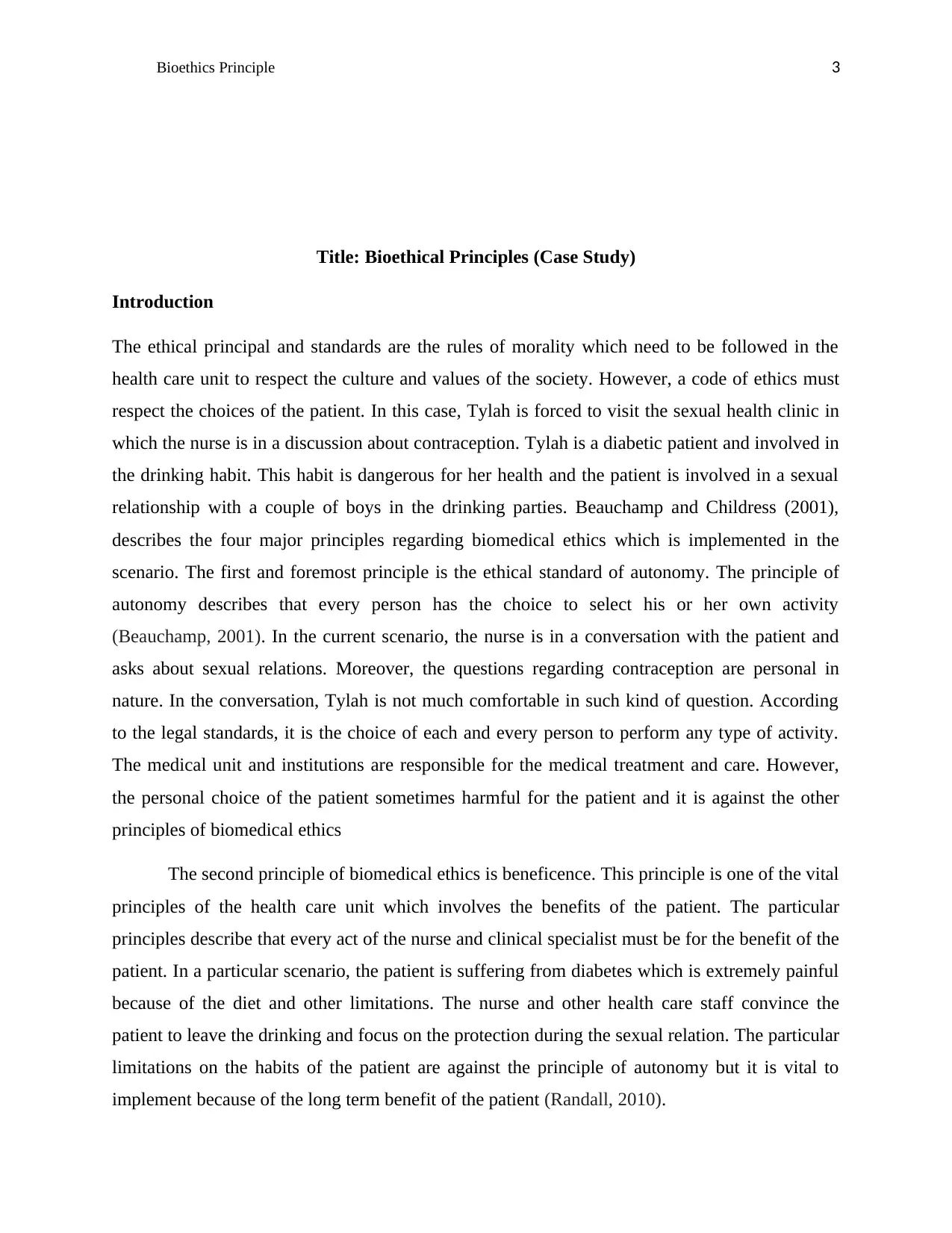
Bioethics Principle 3
Title: Bioethical Principles (Case Study)
Introduction
The ethical principal and standards are the rules of morality which need to be followed in the
health care unit to respect the culture and values of the society. However, a code of ethics must
respect the choices of the patient. In this case, Tylah is forced to visit the sexual health clinic in
which the nurse is in a discussion about contraception. Tylah is a diabetic patient and involved in
the drinking habit. This habit is dangerous for her health and the patient is involved in a sexual
relationship with a couple of boys in the drinking parties. Beauchamp and Childress (2001),
describes the four major principles regarding biomedical ethics which is implemented in the
scenario. The first and foremost principle is the ethical standard of autonomy. The principle of
autonomy describes that every person has the choice to select his or her own activity
(Beauchamp, 2001). In the current scenario, the nurse is in a conversation with the patient and
asks about sexual relations. Moreover, the questions regarding contraception are personal in
nature. In the conversation, Tylah is not much comfortable in such kind of question. According
to the legal standards, it is the choice of each and every person to perform any type of activity.
The medical unit and institutions are responsible for the medical treatment and care. However,
the personal choice of the patient sometimes harmful for the patient and it is against the other
principles of biomedical ethics
The second principle of biomedical ethics is beneficence. This principle is one of the vital
principles of the health care unit which involves the benefits of the patient. The particular
principles describe that every act of the nurse and clinical specialist must be for the benefit of the
patient. In a particular scenario, the patient is suffering from diabetes which is extremely painful
because of the diet and other limitations. The nurse and other health care staff convince the
patient to leave the drinking and focus on the protection during the sexual relation. The particular
limitations on the habits of the patient are against the principle of autonomy but it is vital to
implement because of the long term benefit of the patient (Randall, 2010).
Title: Bioethical Principles (Case Study)
Introduction
The ethical principal and standards are the rules of morality which need to be followed in the
health care unit to respect the culture and values of the society. However, a code of ethics must
respect the choices of the patient. In this case, Tylah is forced to visit the sexual health clinic in
which the nurse is in a discussion about contraception. Tylah is a diabetic patient and involved in
the drinking habit. This habit is dangerous for her health and the patient is involved in a sexual
relationship with a couple of boys in the drinking parties. Beauchamp and Childress (2001),
describes the four major principles regarding biomedical ethics which is implemented in the
scenario. The first and foremost principle is the ethical standard of autonomy. The principle of
autonomy describes that every person has the choice to select his or her own activity
(Beauchamp, 2001). In the current scenario, the nurse is in a conversation with the patient and
asks about sexual relations. Moreover, the questions regarding contraception are personal in
nature. In the conversation, Tylah is not much comfortable in such kind of question. According
to the legal standards, it is the choice of each and every person to perform any type of activity.
The medical unit and institutions are responsible for the medical treatment and care. However,
the personal choice of the patient sometimes harmful for the patient and it is against the other
principles of biomedical ethics
The second principle of biomedical ethics is beneficence. This principle is one of the vital
principles of the health care unit which involves the benefits of the patient. The particular
principles describe that every act of the nurse and clinical specialist must be for the benefit of the
patient. In a particular scenario, the patient is suffering from diabetes which is extremely painful
because of the diet and other limitations. The nurse and other health care staff convince the
patient to leave the drinking and focus on the protection during the sexual relation. The particular
limitations on the habits of the patient are against the principle of autonomy but it is vital to
implement because of the long term benefit of the patient (Randall, 2010).
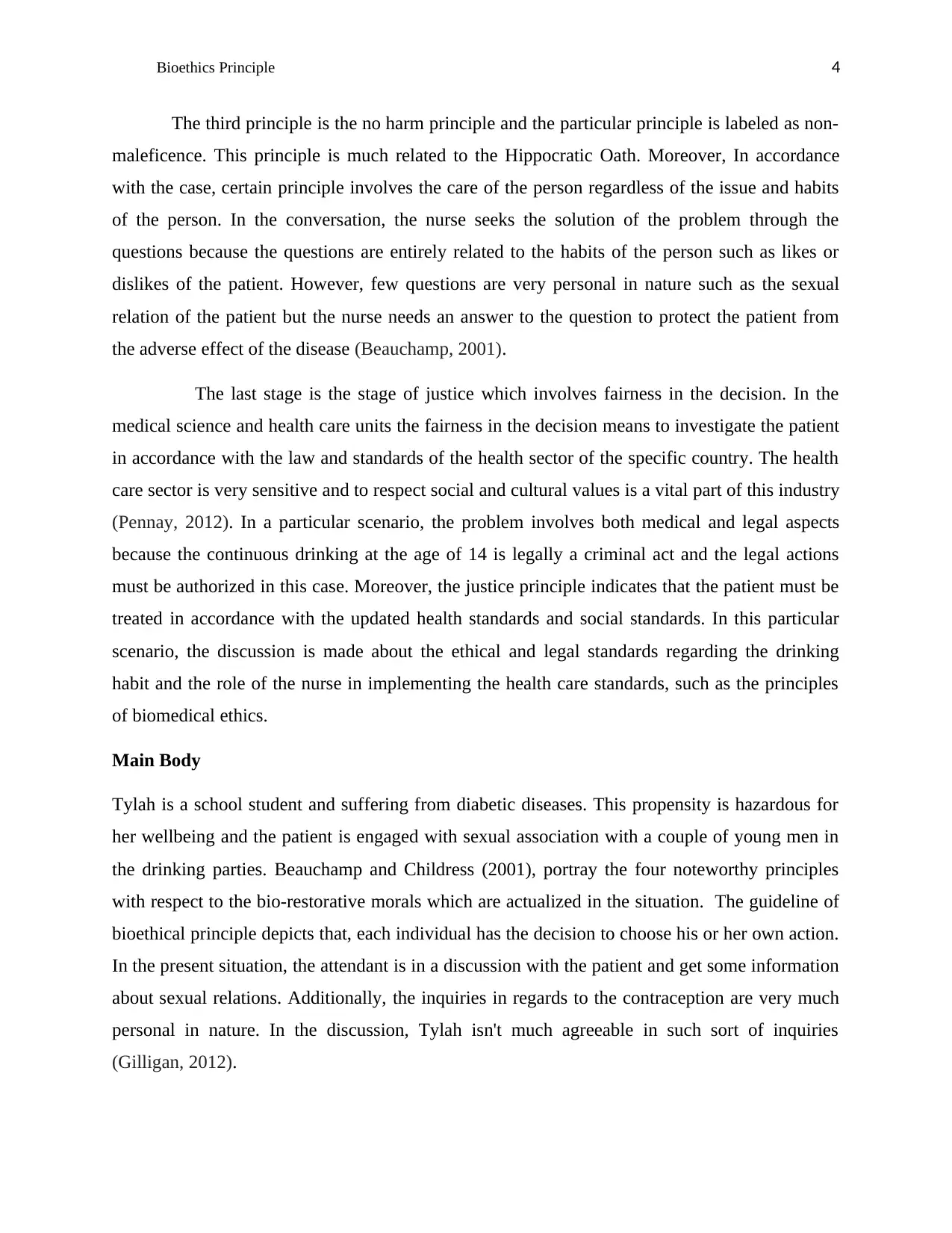
Bioethics Principle 4
The third principle is the no harm principle and the particular principle is labeled as non-
maleficence. This principle is much related to the Hippocratic Oath. Moreover, In accordance
with the case, certain principle involves the care of the person regardless of the issue and habits
of the person. In the conversation, the nurse seeks the solution of the problem through the
questions because the questions are entirely related to the habits of the person such as likes or
dislikes of the patient. However, few questions are very personal in nature such as the sexual
relation of the patient but the nurse needs an answer to the question to protect the patient from
the adverse effect of the disease (Beauchamp, 2001).
The last stage is the stage of justice which involves fairness in the decision. In the
medical science and health care units the fairness in the decision means to investigate the patient
in accordance with the law and standards of the health sector of the specific country. The health
care sector is very sensitive and to respect social and cultural values is a vital part of this industry
(Pennay, 2012). In a particular scenario, the problem involves both medical and legal aspects
because the continuous drinking at the age of 14 is legally a criminal act and the legal actions
must be authorized in this case. Moreover, the justice principle indicates that the patient must be
treated in accordance with the updated health standards and social standards. In this particular
scenario, the discussion is made about the ethical and legal standards regarding the drinking
habit and the role of the nurse in implementing the health care standards, such as the principles
of biomedical ethics.
Main Body
Tylah is a school student and suffering from diabetic diseases. This propensity is hazardous for
her wellbeing and the patient is engaged with sexual association with a couple of young men in
the drinking parties. Beauchamp and Childress (2001), portray the four noteworthy principles
with respect to the bio-restorative morals which are actualized in the situation. The guideline of
bioethical principle depicts that, each individual has the decision to choose his or her own action.
In the present situation, the attendant is in a discussion with the patient and get some information
about sexual relations. Additionally, the inquiries in regards to the contraception are very much
personal in nature. In the discussion, Tylah isn't much agreeable in such sort of inquiries
(Gilligan, 2012).
The third principle is the no harm principle and the particular principle is labeled as non-
maleficence. This principle is much related to the Hippocratic Oath. Moreover, In accordance
with the case, certain principle involves the care of the person regardless of the issue and habits
of the person. In the conversation, the nurse seeks the solution of the problem through the
questions because the questions are entirely related to the habits of the person such as likes or
dislikes of the patient. However, few questions are very personal in nature such as the sexual
relation of the patient but the nurse needs an answer to the question to protect the patient from
the adverse effect of the disease (Beauchamp, 2001).
The last stage is the stage of justice which involves fairness in the decision. In the
medical science and health care units the fairness in the decision means to investigate the patient
in accordance with the law and standards of the health sector of the specific country. The health
care sector is very sensitive and to respect social and cultural values is a vital part of this industry
(Pennay, 2012). In a particular scenario, the problem involves both medical and legal aspects
because the continuous drinking at the age of 14 is legally a criminal act and the legal actions
must be authorized in this case. Moreover, the justice principle indicates that the patient must be
treated in accordance with the updated health standards and social standards. In this particular
scenario, the discussion is made about the ethical and legal standards regarding the drinking
habit and the role of the nurse in implementing the health care standards, such as the principles
of biomedical ethics.
Main Body
Tylah is a school student and suffering from diabetic diseases. This propensity is hazardous for
her wellbeing and the patient is engaged with sexual association with a couple of young men in
the drinking parties. Beauchamp and Childress (2001), portray the four noteworthy principles
with respect to the bio-restorative morals which are actualized in the situation. The guideline of
bioethical principle depicts that, each individual has the decision to choose his or her own action.
In the present situation, the attendant is in a discussion with the patient and get some information
about sexual relations. Additionally, the inquiries in regards to the contraception are very much
personal in nature. In the discussion, Tylah isn't much agreeable in such sort of inquiries
(Gilligan, 2012).
Secure Best Marks with AI Grader
Need help grading? Try our AI Grader for instant feedback on your assignments.
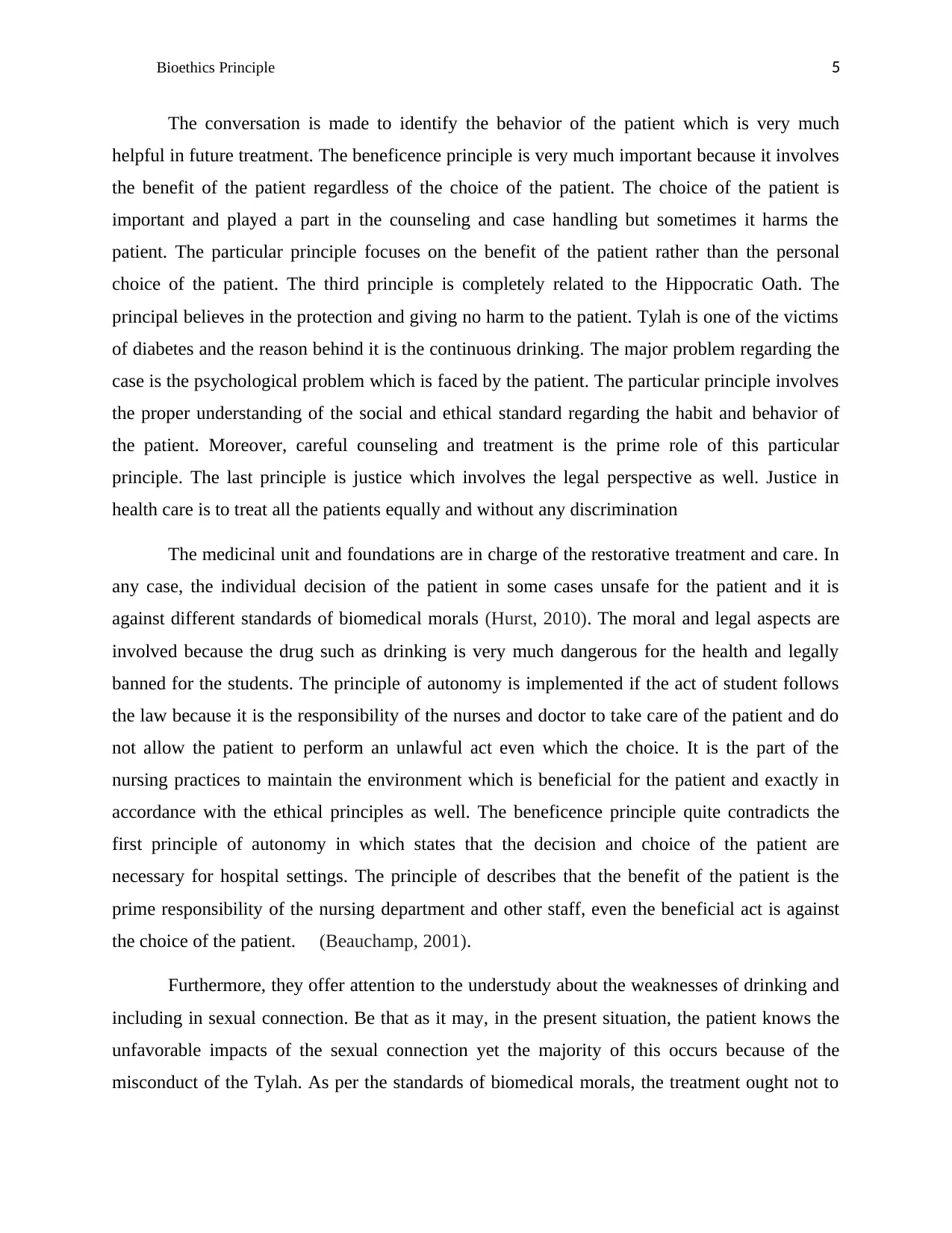
Bioethics Principle 5
The conversation is made to identify the behavior of the patient which is very much
helpful in future treatment. The beneficence principle is very much important because it involves
the benefit of the patient regardless of the choice of the patient. The choice of the patient is
important and played a part in the counseling and case handling but sometimes it harms the
patient. The particular principle focuses on the benefit of the patient rather than the personal
choice of the patient. The third principle is completely related to the Hippocratic Oath. The
principal believes in the protection and giving no harm to the patient. Tylah is one of the victims
of diabetes and the reason behind it is the continuous drinking. The major problem regarding the
case is the psychological problem which is faced by the patient. The particular principle involves
the proper understanding of the social and ethical standard regarding the habit and behavior of
the patient. Moreover, careful counseling and treatment is the prime role of this particular
principle. The last principle is justice which involves the legal perspective as well. Justice in
health care is to treat all the patients equally and without any discrimination
The medicinal unit and foundations are in charge of the restorative treatment and care. In
any case, the individual decision of the patient in some cases unsafe for the patient and it is
against different standards of biomedical morals (Hurst, 2010). The moral and legal aspects are
involved because the drug such as drinking is very much dangerous for the health and legally
banned for the students. The principle of autonomy is implemented if the act of student follows
the law because it is the responsibility of the nurses and doctor to take care of the patient and do
not allow the patient to perform an unlawful act even which the choice. It is the part of the
nursing practices to maintain the environment which is beneficial for the patient and exactly in
accordance with the ethical principles as well. The beneficence principle quite contradicts the
first principle of autonomy in which states that the decision and choice of the patient are
necessary for hospital settings. The principle of describes that the benefit of the patient is the
prime responsibility of the nursing department and other staff, even the beneficial act is against
the choice of the patient. (Beauchamp, 2001).
Furthermore, they offer attention to the understudy about the weaknesses of drinking and
including in sexual connection. Be that as it may, in the present situation, the patient knows the
unfavorable impacts of the sexual connection yet the majority of this occurs because of the
misconduct of the Tylah. As per the standards of biomedical morals, the treatment ought not to
The conversation is made to identify the behavior of the patient which is very much
helpful in future treatment. The beneficence principle is very much important because it involves
the benefit of the patient regardless of the choice of the patient. The choice of the patient is
important and played a part in the counseling and case handling but sometimes it harms the
patient. The particular principle focuses on the benefit of the patient rather than the personal
choice of the patient. The third principle is completely related to the Hippocratic Oath. The
principal believes in the protection and giving no harm to the patient. Tylah is one of the victims
of diabetes and the reason behind it is the continuous drinking. The major problem regarding the
case is the psychological problem which is faced by the patient. The particular principle involves
the proper understanding of the social and ethical standard regarding the habit and behavior of
the patient. Moreover, careful counseling and treatment is the prime role of this particular
principle. The last principle is justice which involves the legal perspective as well. Justice in
health care is to treat all the patients equally and without any discrimination
The medicinal unit and foundations are in charge of the restorative treatment and care. In
any case, the individual decision of the patient in some cases unsafe for the patient and it is
against different standards of biomedical morals (Hurst, 2010). The moral and legal aspects are
involved because the drug such as drinking is very much dangerous for the health and legally
banned for the students. The principle of autonomy is implemented if the act of student follows
the law because it is the responsibility of the nurses and doctor to take care of the patient and do
not allow the patient to perform an unlawful act even which the choice. It is the part of the
nursing practices to maintain the environment which is beneficial for the patient and exactly in
accordance with the ethical principles as well. The beneficence principle quite contradicts the
first principle of autonomy in which states that the decision and choice of the patient are
necessary for hospital settings. The principle of describes that the benefit of the patient is the
prime responsibility of the nursing department and other staff, even the beneficial act is against
the choice of the patient. (Beauchamp, 2001).
Furthermore, they offer attention to the understudy about the weaknesses of drinking and
including in sexual connection. Be that as it may, in the present situation, the patient knows the
unfavorable impacts of the sexual connection yet the majority of this occurs because of the
misconduct of the Tylah. As per the standards of biomedical morals, the treatment ought not to
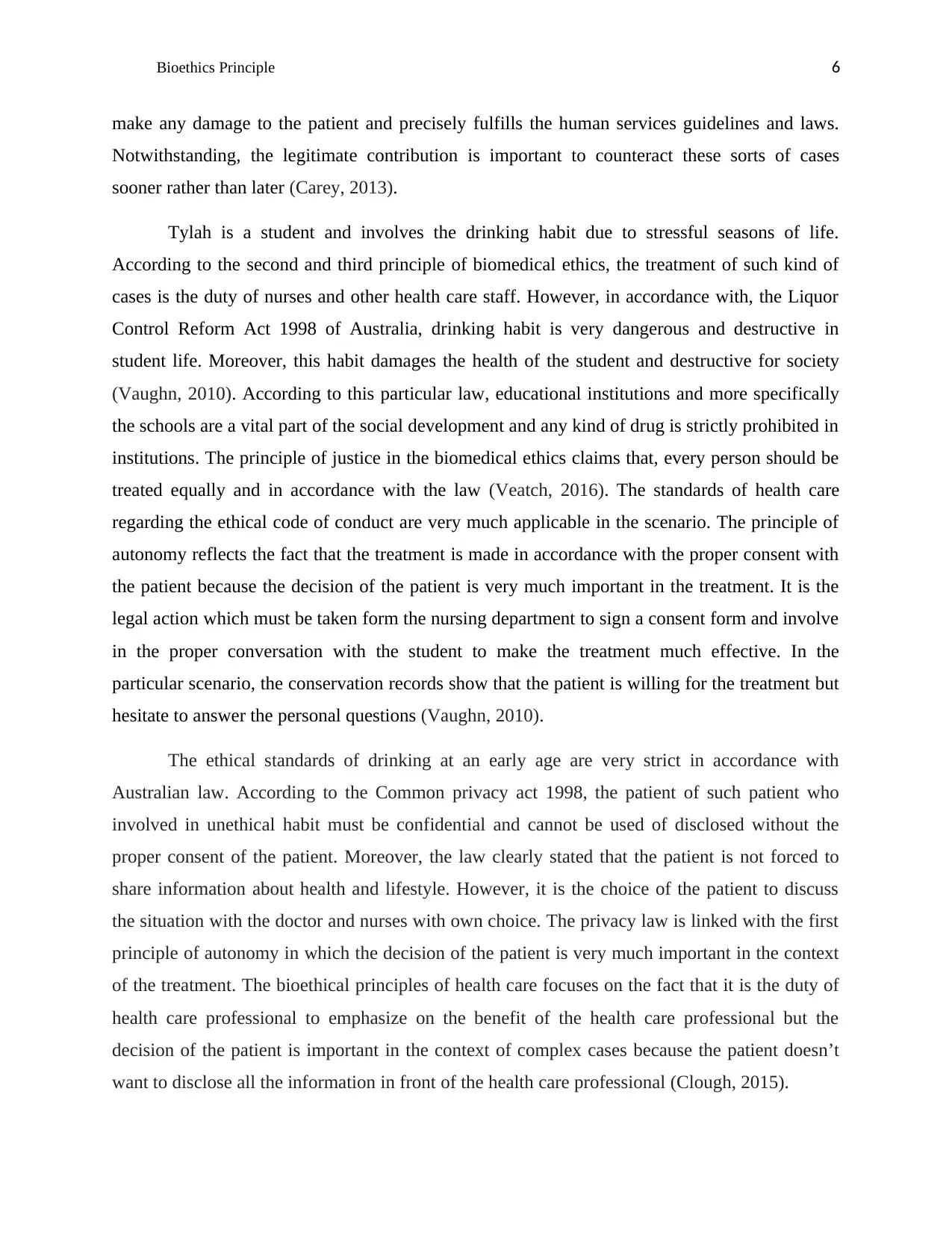
Bioethics Principle 6
make any damage to the patient and precisely fulfills the human services guidelines and laws.
Notwithstanding, the legitimate contribution is important to counteract these sorts of cases
sooner rather than later (Carey, 2013).
Tylah is a student and involves the drinking habit due to stressful seasons of life.
According to the second and third principle of biomedical ethics, the treatment of such kind of
cases is the duty of nurses and other health care staff. However, in accordance with, the Liquor
Control Reform Act 1998 of Australia, drinking habit is very dangerous and destructive in
student life. Moreover, this habit damages the health of the student and destructive for society
(Vaughn, 2010). According to this particular law, educational institutions and more specifically
the schools are a vital part of the social development and any kind of drug is strictly prohibited in
institutions. The principle of justice in the biomedical ethics claims that, every person should be
treated equally and in accordance with the law (Veatch, 2016). The standards of health care
regarding the ethical code of conduct are very much applicable in the scenario. The principle of
autonomy reflects the fact that the treatment is made in accordance with the proper consent with
the patient because the decision of the patient is very much important in the treatment. It is the
legal action which must be taken form the nursing department to sign a consent form and involve
in the proper conversation with the student to make the treatment much effective. In the
particular scenario, the conservation records show that the patient is willing for the treatment but
hesitate to answer the personal questions (Vaughn, 2010).
The ethical standards of drinking at an early age are very strict in accordance with
Australian law. According to the Common privacy act 1998, the patient of such patient who
involved in unethical habit must be confidential and cannot be used of disclosed without the
proper consent of the patient. Moreover, the law clearly stated that the patient is not forced to
share information about health and lifestyle. However, it is the choice of the patient to discuss
the situation with the doctor and nurses with own choice. The privacy law is linked with the first
principle of autonomy in which the decision of the patient is very much important in the context
of the treatment. The bioethical principles of health care focuses on the fact that it is the duty of
health care professional to emphasize on the benefit of the health care professional but the
decision of the patient is important in the context of complex cases because the patient doesn’t
want to disclose all the information in front of the health care professional (Clough, 2015).
make any damage to the patient and precisely fulfills the human services guidelines and laws.
Notwithstanding, the legitimate contribution is important to counteract these sorts of cases
sooner rather than later (Carey, 2013).
Tylah is a student and involves the drinking habit due to stressful seasons of life.
According to the second and third principle of biomedical ethics, the treatment of such kind of
cases is the duty of nurses and other health care staff. However, in accordance with, the Liquor
Control Reform Act 1998 of Australia, drinking habit is very dangerous and destructive in
student life. Moreover, this habit damages the health of the student and destructive for society
(Vaughn, 2010). According to this particular law, educational institutions and more specifically
the schools are a vital part of the social development and any kind of drug is strictly prohibited in
institutions. The principle of justice in the biomedical ethics claims that, every person should be
treated equally and in accordance with the law (Veatch, 2016). The standards of health care
regarding the ethical code of conduct are very much applicable in the scenario. The principle of
autonomy reflects the fact that the treatment is made in accordance with the proper consent with
the patient because the decision of the patient is very much important in the treatment. It is the
legal action which must be taken form the nursing department to sign a consent form and involve
in the proper conversation with the student to make the treatment much effective. In the
particular scenario, the conservation records show that the patient is willing for the treatment but
hesitate to answer the personal questions (Vaughn, 2010).
The ethical standards of drinking at an early age are very strict in accordance with
Australian law. According to the Common privacy act 1998, the patient of such patient who
involved in unethical habit must be confidential and cannot be used of disclosed without the
proper consent of the patient. Moreover, the law clearly stated that the patient is not forced to
share information about health and lifestyle. However, it is the choice of the patient to discuss
the situation with the doctor and nurses with own choice. The privacy law is linked with the first
principle of autonomy in which the decision of the patient is very much important in the context
of the treatment. The bioethical principles of health care focuses on the fact that it is the duty of
health care professional to emphasize on the benefit of the health care professional but the
decision of the patient is important in the context of complex cases because the patient doesn’t
want to disclose all the information in front of the health care professional (Clough, 2015).
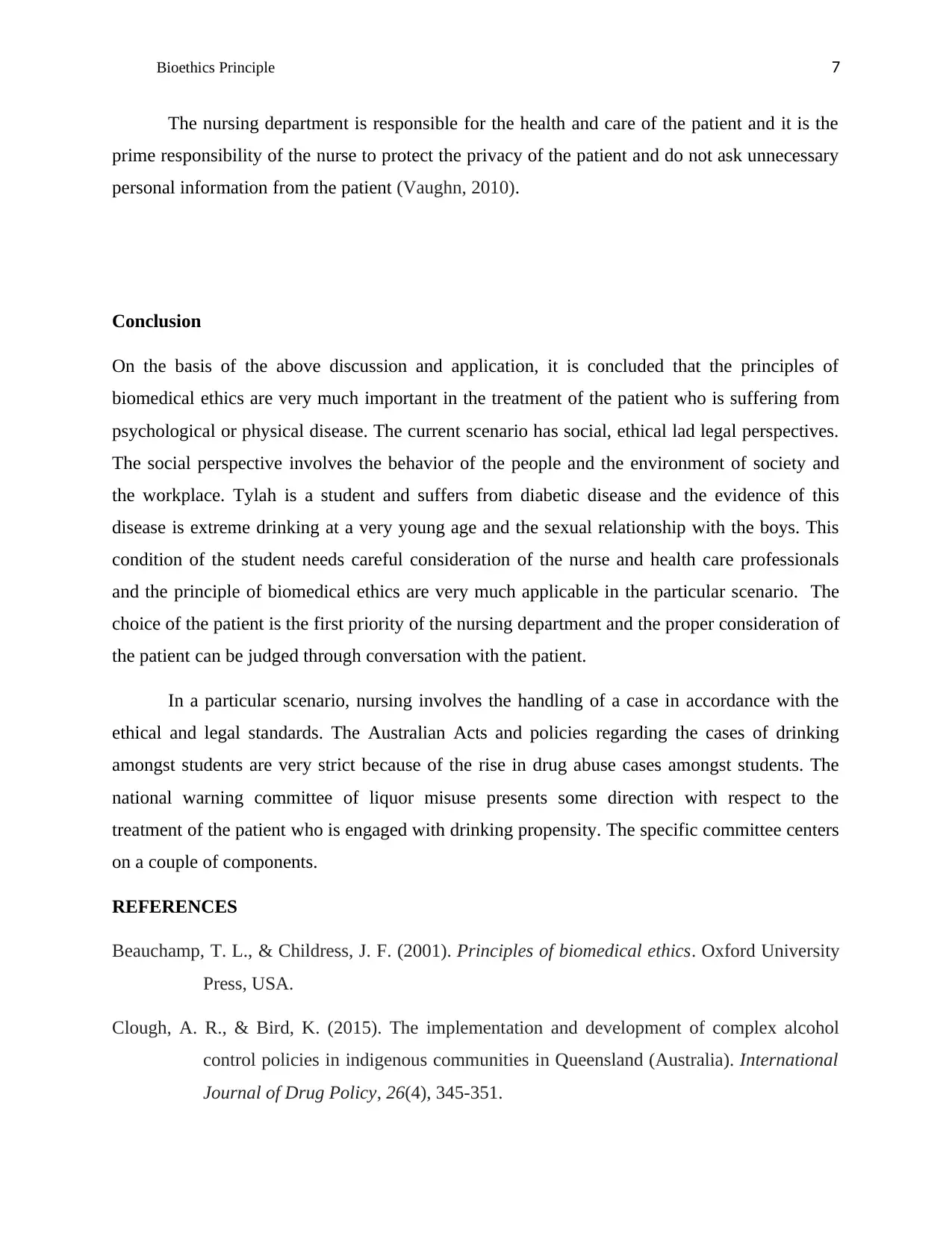
Bioethics Principle 7
The nursing department is responsible for the health and care of the patient and it is the
prime responsibility of the nurse to protect the privacy of the patient and do not ask unnecessary
personal information from the patient (Vaughn, 2010).
Conclusion
On the basis of the above discussion and application, it is concluded that the principles of
biomedical ethics are very much important in the treatment of the patient who is suffering from
psychological or physical disease. The current scenario has social, ethical lad legal perspectives.
The social perspective involves the behavior of the people and the environment of society and
the workplace. Tylah is a student and suffers from diabetic disease and the evidence of this
disease is extreme drinking at a very young age and the sexual relationship with the boys. This
condition of the student needs careful consideration of the nurse and health care professionals
and the principle of biomedical ethics are very much applicable in the particular scenario. The
choice of the patient is the first priority of the nursing department and the proper consideration of
the patient can be judged through conversation with the patient.
In a particular scenario, nursing involves the handling of a case in accordance with the
ethical and legal standards. The Australian Acts and policies regarding the cases of drinking
amongst students are very strict because of the rise in drug abuse cases amongst students. The
national warning committee of liquor misuse presents some direction with respect to the
treatment of the patient who is engaged with drinking propensity. The specific committee centers
on a couple of components.
REFERENCES
Beauchamp, T. L., & Childress, J. F. (2001). Principles of biomedical ethics. Oxford University
Press, USA.
Clough, A. R., & Bird, K. (2015). The implementation and development of complex alcohol
control policies in indigenous communities in Queensland (Australia). International
Journal of Drug Policy, 26(4), 345-351.
The nursing department is responsible for the health and care of the patient and it is the
prime responsibility of the nurse to protect the privacy of the patient and do not ask unnecessary
personal information from the patient (Vaughn, 2010).
Conclusion
On the basis of the above discussion and application, it is concluded that the principles of
biomedical ethics are very much important in the treatment of the patient who is suffering from
psychological or physical disease. The current scenario has social, ethical lad legal perspectives.
The social perspective involves the behavior of the people and the environment of society and
the workplace. Tylah is a student and suffers from diabetic disease and the evidence of this
disease is extreme drinking at a very young age and the sexual relationship with the boys. This
condition of the student needs careful consideration of the nurse and health care professionals
and the principle of biomedical ethics are very much applicable in the particular scenario. The
choice of the patient is the first priority of the nursing department and the proper consideration of
the patient can be judged through conversation with the patient.
In a particular scenario, nursing involves the handling of a case in accordance with the
ethical and legal standards. The Australian Acts and policies regarding the cases of drinking
amongst students are very strict because of the rise in drug abuse cases amongst students. The
national warning committee of liquor misuse presents some direction with respect to the
treatment of the patient who is engaged with drinking propensity. The specific committee centers
on a couple of components.
REFERENCES
Beauchamp, T. L., & Childress, J. F. (2001). Principles of biomedical ethics. Oxford University
Press, USA.
Clough, A. R., & Bird, K. (2015). The implementation and development of complex alcohol
control policies in indigenous communities in Queensland (Australia). International
Journal of Drug Policy, 26(4), 345-351.
Paraphrase This Document
Need a fresh take? Get an instant paraphrase of this document with our AI Paraphraser
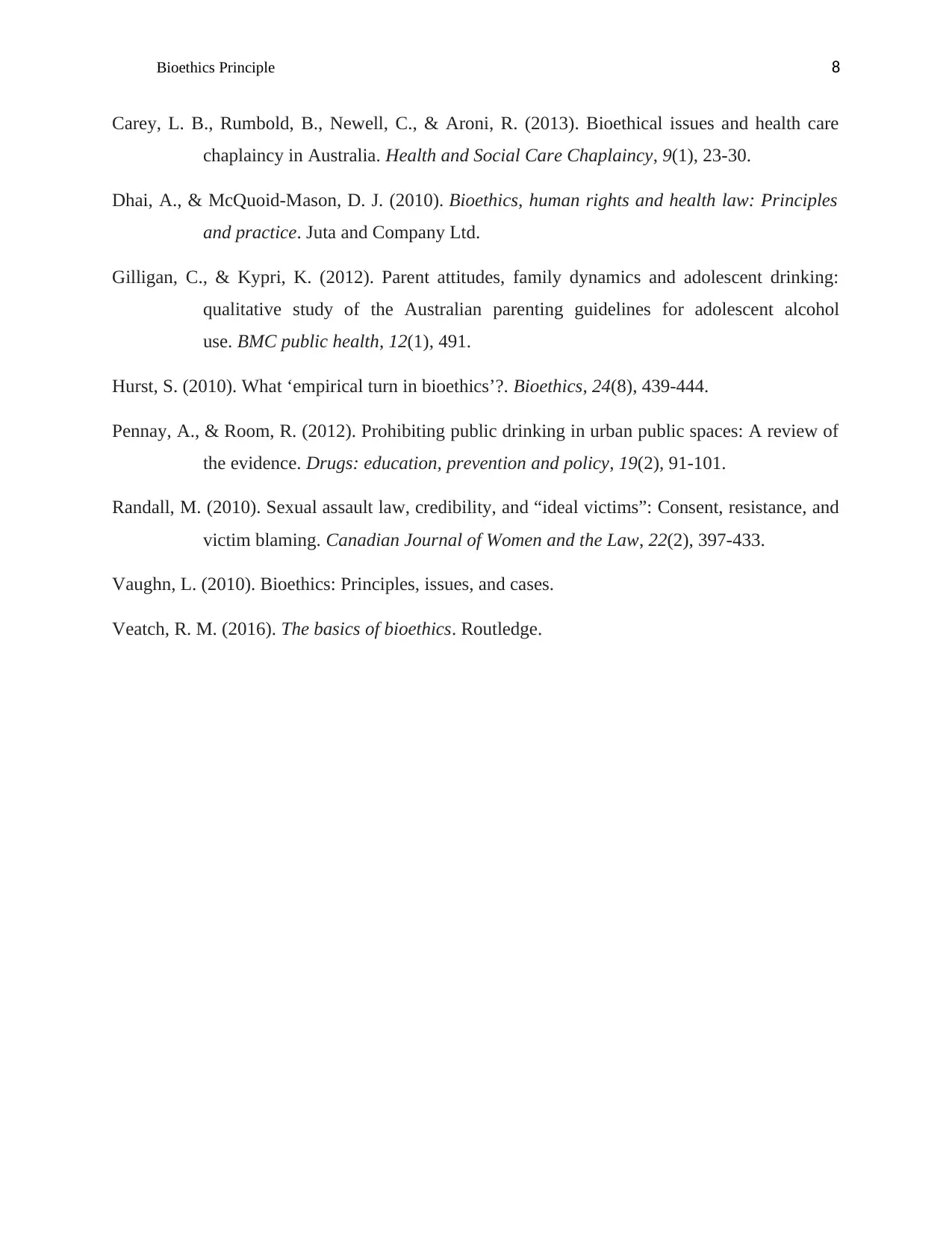
Bioethics Principle 8
Carey, L. B., Rumbold, B., Newell, C., & Aroni, R. (2013). Bioethical issues and health care
chaplaincy in Australia. Health and Social Care Chaplaincy, 9(1), 23-30.
Dhai, A., & McQuoid-Mason, D. J. (2010). Bioethics, human rights and health law: Principles
and practice. Juta and Company Ltd.
Gilligan, C., & Kypri, K. (2012). Parent attitudes, family dynamics and adolescent drinking:
qualitative study of the Australian parenting guidelines for adolescent alcohol
use. BMC public health, 12(1), 491.
Hurst, S. (2010). What ‘empirical turn in bioethics’?. Bioethics, 24(8), 439-444.
Pennay, A., & Room, R. (2012). Prohibiting public drinking in urban public spaces: A review of
the evidence. Drugs: education, prevention and policy, 19(2), 91-101.
Randall, M. (2010). Sexual assault law, credibility, and “ideal victims”: Consent, resistance, and
victim blaming. Canadian Journal of Women and the Law, 22(2), 397-433.
Vaughn, L. (2010). Bioethics: Principles, issues, and cases.
Veatch, R. M. (2016). The basics of bioethics. Routledge.
Carey, L. B., Rumbold, B., Newell, C., & Aroni, R. (2013). Bioethical issues and health care
chaplaincy in Australia. Health and Social Care Chaplaincy, 9(1), 23-30.
Dhai, A., & McQuoid-Mason, D. J. (2010). Bioethics, human rights and health law: Principles
and practice. Juta and Company Ltd.
Gilligan, C., & Kypri, K. (2012). Parent attitudes, family dynamics and adolescent drinking:
qualitative study of the Australian parenting guidelines for adolescent alcohol
use. BMC public health, 12(1), 491.
Hurst, S. (2010). What ‘empirical turn in bioethics’?. Bioethics, 24(8), 439-444.
Pennay, A., & Room, R. (2012). Prohibiting public drinking in urban public spaces: A review of
the evidence. Drugs: education, prevention and policy, 19(2), 91-101.
Randall, M. (2010). Sexual assault law, credibility, and “ideal victims”: Consent, resistance, and
victim blaming. Canadian Journal of Women and the Law, 22(2), 397-433.
Vaughn, L. (2010). Bioethics: Principles, issues, and cases.
Veatch, R. M. (2016). The basics of bioethics. Routledge.
1 out of 8
Related Documents
Your All-in-One AI-Powered Toolkit for Academic Success.
+13062052269
info@desklib.com
Available 24*7 on WhatsApp / Email
![[object Object]](/_next/static/media/star-bottom.7253800d.svg)
Unlock your academic potential
© 2024 | Zucol Services PVT LTD | All rights reserved.





